Seeds of Change: The Lasting (and Global) Impact of Planting Trees in North Africa
ForestPlanet is helping the High Atlas Foundation bring fruiting trees to thousands of people residing in the Atlas Mountains foothills. The Taftchna Nursery is in the Moroccan town of Khenifra and came online early in 2023. The nursery currently has the capacity to produce 135,000 seedlings each year, and to plant healthy young trees into surrounding communities within twelve months.
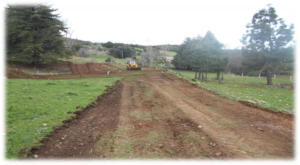
Work begins! Leveling the site for the Taftchna Nursery, January 2023
The tree species grown in this nursery include carob, fig, pomegranate, and cherry. The recipients of the trees are area families who currently scratch out a living growing corn and barley and raising herd animals. These trees will provide additional reliable income to hundreds of families, making sure that their children are properly nourished, can live indoors, and will attend school.
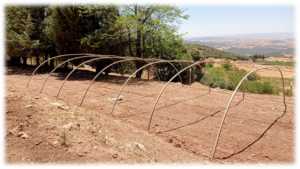
Canopy frame for the main nursery, February 2023
This additional income will especially benefit the young girls in these families. Attending school is not expensive, but uniforms and materials can sometimes pose a financial challenge. When resources are scarce and the families are forced to make hard decisions, typically it is the girls who are kept home to save money and help work the family plots.
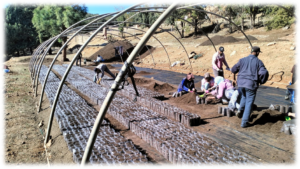
Preparing seed bags for carob, February 2023
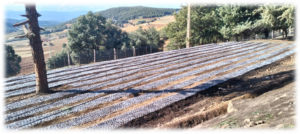
Fig, cherry, and pomegranate seedlings, February 2023
Healthy fruit trees can increase household incomes (and access to nutrition) by 100% or more. Though carob trees take a bit longer to mature, the cherry, fig, and pomegranate trees start producing fruit within three years. This allows the farmers to interplant ground crops (carrots, potatoes, and other vegetables) around the young trees, putting to good use moisture retained by the tree roots.
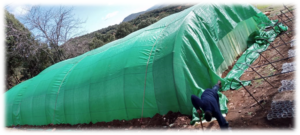
Draping the nursery frame with canopy
Carob trees are particularly valuable, since they can live for many decades and there is high market demand for the nutritious powder produced from their seeds.
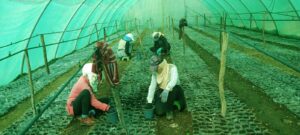
Starting carob seeds
In December 2023, the first crop of 135,000 trees will be distributed from this nursery to 700 area families. Many of the trees are carob, which will potentially provide these families with generations of income.
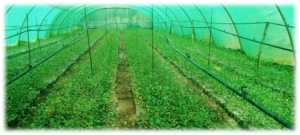
Healthy carob seedlings, April 2023
These trees will reduce global CO2 emissions by degree, for sure, but it’s the follow-on impacts that start to add up. Extreme poverty compels people to behave in an unsustainable manner, i.e. it’s basic human nature to focus on the immediate needs of your family at the expense of thinking for the long term. This project is just one more example of moving people further from the edge of financial despair, and reducing atmospheric CO2 concentrations at the same time – double bubble!
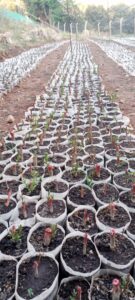
Healthy pomegranate seedlings, April 2023
There’s room to grow! Even a modest investment can help the Taftchna Nursery expand to produce 250,000 trees annually. Roughly 15 million trees are needed in the Khenifra region alone, so the quicker we can expand production, the sooner we can meet the need.
We hope you will consider donating today!
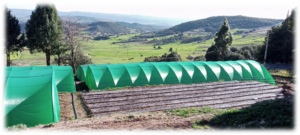
The finished product: a working seedling farm!
